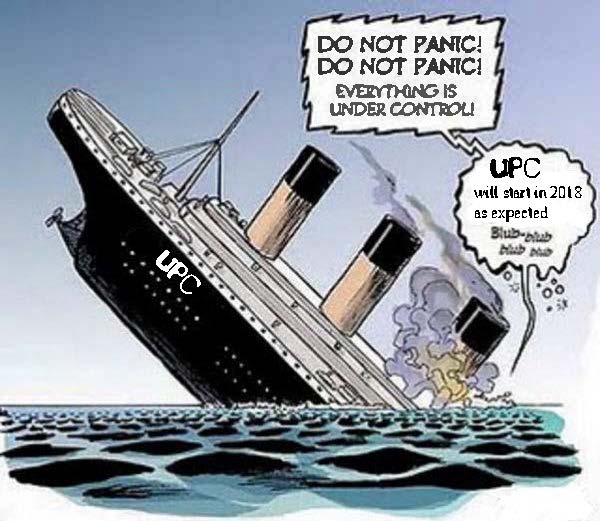

THE UPC is dead and good riddance to it. One can easily tell who it's for based on who's lobbying for it and lying about it (to push it through and demonise resistance).
"Welcome to Team UPC of 2020. It's a chain of letters containing nothing but lies."So one liar quotes another as if to disclaim or rid oneself from responsibility for these lies.
"Trump said..."
"Xi said..."
Welcome to Team UPC of 2020. It's a chain of letters containing nothing but lies.
And holy crap, look at this prank! JUVE continues to print lies as headlines for Team UPC and Alexander Ramsay.
Well done, JUVE, you are now officially a compromised publication -- the complete opposite of what you used to be.
When can you be labeled a lying tabloid?
Mathieu Klos amplified these lies when he tweeted: "We don't expect major disruption to the UPC," says Alexander Ramsay, chair of its Preparatory Committee, following the announcement of UK withdrawal. JUVE Patent caught up with Ramsay to see if he's still optimistic for the UPC's future. Full interview..."
"Well done, JUVE, you are now officially a compromised publication -- the complete opposite of what you used to be."So they don't fact-check. They just print and reprint lies, even with lies as headlines!
Amy Sandys does it again. Is this journalism or vandalism?
Shame on you, JUVE. Shame on you.
I miss the old JUVE, the JUVE that cared about facts and actually exposed or (un)covered EPO abuses.
Has the business model changed?
Anyway, JUVE isn't the sole culprit. One might say that it's merely the echo of the litigation industry (neither science nor jurists).
Over at Lexology, for instance, Mayer Brown's Christoph J. Crützen, Mark A. Prinsley, Oliver Yaros and Ulrich Worm have just amplified their article entitled "UK confirms that it will not become a member of the Unitary Patent and Unified Patent Court" (well, there's no Unitary Patent and Unified Patent Court... it's dead. You cannot participate in things that do not exist!)
Here's what they say:
It is currently unclear how the UK government's decision will impact the implementation of the UPC, particularly given the UK's involvement in the UPC project to date. Such involvement includes the UK (alongside Germany and France) being one of three signatories whose ratification was required for the UPC to come into force. Likewise, a central division of the UPC was to be located in London and was set to host patent disputes concentrated on the life sciences sector.
Companies can avoid using the Unitary Patent and Unified Patent Court altogether by opting instead to file a national application (or to opt-out of the UPC system when filing and validating an EP application) in the individual European countries of their choice. There are a number of advantages and disadvantages to both options. For example, depending on the countries selected, national filings can be more costly (e.g. because of translation requirements). In comparison, EP and/or Unitary Patent application can be filed in English, and no translations are required until grant.
Despite fears that Brexit would halt negotiations, the UK ratified the Unified Patent Court (UPC) agreement in April 2018. At the time, this was considered an important milestone, as the UK was one of three mandatory signatories required for the agreement to come into force. The announcement last week that the UK is withdrawing from the system could represent the end of the line for the UPC, which is also waiting on the outcome of a challenge in Germany’s Federal Constitutional Court.
"Germany is not going to ratify. The British ratification is now moot. This leaves only France, one of three nations that must ratify."We've meanwhile stumbled upon some other new nonsense from Team UPC. "The European Commission, via its IP Helpdesk," one of them wrote, "seems to acknowledge the news reported by ⦠@IAM_magazineâ© that UK will not participate in #UPC. http://www.iprhelpdesk.eu/news/uk-will-not-participate-unified-patent-court-system …"
This comes from a person who's rude to the judges, just like the EPO's management. Another new tweet says "UPC DE constitutional complaint, as of 2nd half of Feb 2020: ââ¬Å¾[The Court] expects a ruling in case 2 BvR 739/17, concerning the complaint against German ratification of the Unified Patent Court Agreement ‘within the next few months’. An FCC spokesman has declared this [...].“
He's citing something seemingly irrelevant, in fact citing an old Kluwer (Team UPC) tweet, predating the final blow to UPC (the UK's announcement)! How convenient....
This is what he cites: "UPDATE: Ruling of German Federal Constitutional Court in case 2 BvR 739/17, concerning German ratification of the Unified Patent Court Agreement, expected ‘within the next few months’..." (Brexit and the latest announcement can delay this further).
So again we see subtle lies. People now cite something from last month, which also refutes Managing IP's claims that we can expect a decision by this month's end.
The FFII's President recalls and quotes: "UPC: Poland and the Czech Republic backed out because the UP and UPC system turned out to incur high economic costs, rather than benefits..."
"It's not hard to guess which side litigators are on. They're with the liars.""Team UPC never or rarely brings that up," I responded. "It might scare away those whom they lie to."
They still pretend that if the FCC in Germany dismisses the complaint, then all will be rosy. But the government in Berlin already stated that it would not ratify in light of Brexit and the latest situation. Team UPC is now hanging onto outdated barriers.
It's not hard to guess which side litigators are on. They're with the liars.
"Progress towards the Unitary Patent System has been delayed" is a quote we saw this morning in Open Access Government.
Nope.
Not delayed.
It's dead.
Stop spreading lies in the media...
Here's the whole thing in context:
As well as taking steps to facilitate AV-related innovation activity and prepare the way for driverless motoring, many EU member states have simplified the process of securing patent protection for new inventions.
The planned introduction of a pan-European Unitary Patent System, which the UK is already signed up to regardless of what happens with Brexit, promises to simplify the patent system considerably. Under the new system, businesses will be able to apply for a single Unitary Patent, spanning all participating countries of the EU, without the need to validate the patent at the jurisdictional level. For innovators of AV-related technologies, the new system could provide a cost-effective way to secure commercial protection across the EU, allowing time for markets and regulatory environments to continue to evolve.
Progress towards the Unitary Patent System has been delayed due to Brexit and a constitutional challenge in Germany. However, once these hurdles are overcome, the newly-harmonised system should bring benefits for European innovators and help to attract investment.
Among those set to benefit most from the incoming changes to the patent system are innovators in dynamic or evolving markets, such as the AV industry. A single renewal fee will be payable annually on each Unitary Patent, which will be equivalent to the current cost of renewal fees in the ‘top four’ European countries – UK, Germany, France and Holland.
Under the current system, once a European patent is granted, the patent owner will normally validate it in just a handful of EU countries. By contrast, with a new Unitary Patent, innovators will have the potential in time to cover 26 of the 27 member states for a similar cost. The coverage provided in these ‘bonus’ countries could deliver unexpected benefits to some companies, particularly if there is uncertainty about where market opportunities could arise in the future due to the evolving regulatory and technological landscape.
"They bombard everything, everywhere with misleading 'information' or 'advice'."To quote: "The UK Prime Minister’s Office has confirmed (27.02.20) that the UK will not be participating in the UPC system saying: “Participating in a court that applies EU law and bound by the CJEU is inconsistent with our aims of becoming an independent self-governing nation.” Perhaps not surprising, given the wider signs emerging from Downing Street of late and whilst it may be a negotiating tactic, we wouldn’t bet on it. It will be interesting now to see what happens next with the UPC project, post this UK government announcement. All eyes will now turn to Germany and the approach they intend to take. What is certainly clear is that the UPC will be less attractive to business without the UK’s participation in it."
Well, there's no UPC. So that's kind of a pointless statement, isn't it?
Mondaq has also just republished for J A Kemp LLP, which pretends this is about non-participation rather than the whole UPC collapsing (it cannot exist without this participation of the UK). To quote:
Following publication of the UK Government's paper relating to the future relationship of the UK with the EU, a government spokesperson has confirmed that the UK will "not be seeking involvement in the UP/UPC system".
The UP/UPC system is an EU initiative to establish a Unitary Patent (UP) having unitary effect throughout the EU member states, and to establish the Unified Patent Court (UPC) to hear disputes relating to the Unitary Patent, and also relating to European patents having effect in the EU member states.
